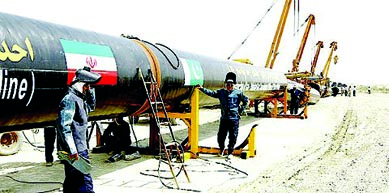November 08-2013

Oil Minister Bijan Namdar-Zanganeh says he sees no hope that the gas pipeline link with Pakistan will ever be built and he expects the contract for gas sales to Pakistan will be annulled. That would be a major economic blow to Iran.
In one sense, the announcement was stunning, because both countries have issued innumerable statements proclaiming that the pipeline project has been moving along merrily.
On the other hand, as readers of the Iran Times know, the project was deeply troubled because Pakistan did not have the capital required for the project and could not get any loans because of the sanctions on Iran.
In its latest effort to fund the project, Pakistan asked Iran last month to put up $2 billion. But on Tuesday, the Daily Times of Pakistan reported that Iran’s deputy oil minister, Ali Majidi, had told Pakistan it must fund the pipeline itself.
Zanganeh spoke almost dismissively of the pipeline project last Wednesday.
“The contract for supplying gas to Pakistan is likely to be annulled,” he told reporters on the sidelines of a gas forum in Tehran. “Given the current conditions, we do not have any hope for exporting gas to Pakistan.”
Some suspected the harsh words from Zanganeh were just part of a ploy to try to goose the Pakistanis into action.
Others said it would be far more logical for Iran to propose putting the project on hold in anticipation that sanctions will end before too long and the project could then go forward.
But to abandon the project is to force Pakistan to go elsewhere for natural gas. And once it commits to another supplier, Iran will have shut itself out of the Pakistani market.
Iran currently exports natural gas in quantity to only a single country, Turkey. It exports small volumes to Armenia. And it has an arrangement with Azerbaijan under which it sends gas into the Azerbaijani enclave of Nakhichevan, which Azerbaijan pays for by supplying an equal volume of gas to Iranian communities adjacent to its border.
Iran has the second largest oil reserves in the world. (Russia is first.) But despite four decades of effort, Iran has only a solitary major client and most of its gas sits untapped or, worse, is burned off.
The pipeline to Pakistan is almost complete on the Iranian side. It supplies gas to many Iranian communities all across southern Iran.
Pakistan has an acute energy crisis. It built many electricity-generating plants to be run on natural gas that was thought to exist in quantity in Pakistan. But exploration has not found that much.
The shortage prompted the government to announce recently that for three months this winter gas will be supplied in Punjab state only for cooking purposes and that no gas in the form of compressed natural gas (CNG) will be made available for cars during that time. Pakistan has been promoting CNG-powered vehicles more than any other country in the world.
Pakistan’s natural gas production is currently 4 billion cubic feet a day against demand of 6 billion. Under the 2009 agreement with Iran, Pakistan was to get 1 billion cubic feet daily from Iran starting in 2014.
Pakistani Petroleum Minister Shahid Khaqan Abbasi reacted to Zanganeh’s pipeline remarks by saying, “There is absolutely no chance to abandon the pipeline project because we need it.”
But a Pakistani think-tank last month issued a report saying the pricing agreement with Iran would be a disaster, making Pakistan pay four times the current market price for natural gas. It said Pakistan needed to renegotiate the price or look elsewhere.
The government has not responded to the study publicly. But Zanganeh said that in the last two months the Pakistani government has made numerous complaints to Iran that it wants to charge too much for gas.
The pipeline was originally designed to go from the South Pars gasfield in the Persian Gulf across southern Iran and Pakistan and into India with a possible spur to China. But China never showed much interest and India dropped out.
Zanganeh said, “I believe the Pakistan gas export contract has no economic justification without India and China.” He did not explain that remark, but it seemed to serve as a key justification for dumping the deal. However, it could also serve as a justification for re-opening the contract and re-negotiating it.
Some suspected Zanganeh was eager to invoke the penalty clause in the contract and make Pakistan pay while receiving no gas. But Zanganeh dismissed such talk, saying Pakistan “doesn’t even have the financial resources to pay the penalty.”




















